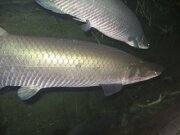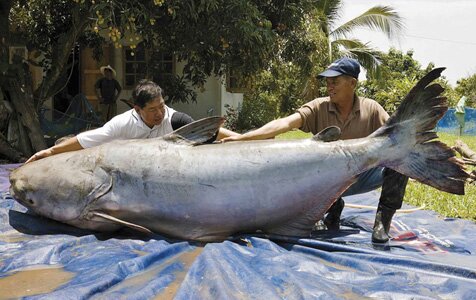Megafishes Project Tracks Freshwater Giants
From Microcosm Aquarium Explorer
Megafishes Project Underway
They are the behemoths that ignite the imaginations of fishermen and the growing concerns of conservation biologists alike. Led by aquatic ecologist Zeb Hogan, Ph.D., the recently launched Megafishes Project is starting to track and document the conservation status of the world's largest freshwater fish species.
Among the targets are giant catfishes, gars, freshwater stingrays, carp, sturgeon, and salmon, with a minimum size limit of 2 meters (6.5 ft) in length and 100 kg (220 lbs) in weight.
The current known records include a Mekong Giant Catfish (Pangasianodon gigas) caught near the Thai side of the Mekong River in May, 2005. The fish weighed 293 kg (646 lb) and measured 2.7 m (9 ft) in length. Despite efforts to have it released, the fish did not survive.
Often cited as the longest freshwater fish on record is a the Arapaima (Arapaima gigas), also known as Pirarucu, reported to reach a length of 4 m (13 ft) with weights in the 200 kg (440 lb) range.

Sturgeon that spend most of their time in the ocean but migrate into freshwater rivers are larger. The White Sturgeon (Acipenser transmontanus) is reported to reach 6.1 m (20 ft.) in length and 816 kg (1,799 lb) in weight.
Critical Threats
According to Zeb Hogan, the actual largest freshwater species may be the Chinese Paddlefish (Psephurus gladius), a native of the Yangtze River and believed to reach 7 meters (23 ft) and 500 kg (1,100 lbs). None have been reported caught since 2003.
According to the Megafishes Project: "Many of these large species are facing critical threats. A number of factors from overfishing and dams to pollution and habitat destruction contribute to the dangers faced by different varieties of fish. As a result, many of these fish are on the path toward extinction, a warning sign of severe problems confronting river ecosystems."
Plans for the Megafishes Project include expeditions to six continents and 14 highly diverse freshwater ecosystems. Asia started in 2007; Australia, Africa, and Europe will be visited in 2008; the Americas in 2009.
Dr. Hogan is currently a member of the Department of Natural Resources and Environmental Science at the University of Nevada-Reno.
Sponsors of the Megafishes Project include the National Geographic Society and the World Wildlife Fund.









